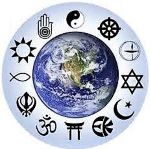 In my years with this congregation, I have often remarked on what a peculiar group we are theologically – atheists and Humanists, Christians and Jews, Buddhists and none-of-the-above. Often we do pretty well at getting along even in the face of our differences. Some of the time, we might even reach a deeper level with each other, either because of or despite the different ways we view the world and our places in it. I have found it enlivening to be a part of this experiment in human community, whether one’s deeper need happens to be the comfort of feeling accepted or the challenge that difference affords us. In my years with this congregation, I have often remarked on what a peculiar group we are theologically – atheists and Humanists, Christians and Jews, Buddhists and none-of-the-above. Often we do pretty well at getting along even in the face of our differences. Some of the time, we might even reach a deeper level with each other, either because of or despite the different ways we view the world and our places in it. I have found it enlivening to be a part of this experiment in human community, whether one’s deeper need happens to be the comfort of feeling accepted or the challenge that difference affords us.
I recall a visitor one Sunday reminding me of Karen Armstrong’s The Great Transformation: The Beginning of Our Religious Traditions. In that book, Ms. Armstrong lays out the history that she says lies behind our postmodern ways of thinking.
Covering the period of 1600 BCE to just before the time of Jesus, Ms. Armstrong examines pivotal events in four societies and the changes in religious and social ideas those events brought about. In China, society became highly ritualized in order to further marginalize those who tended toward violence. The Greeks thrived on violence and competition, but developed a reliance on reason and a strong sense of the polis, the city-state that became the heart of individual and corporate identity and led to the central ideas of democracy. The Jews lifted their god, Yahweh, first out of the pantheon of all the gods and then into the divine stratosphere as the one-and-only-God, making it possible to understand oneself and one’s tribe as the Chosen Ones. On the Indian subcontinent, yogis, gurus, and spiritual seekers became more and more introspective, reaching deep into the human psyche for answers to life’s persistent questions.
Those sages who changed the world in earlier times developed an ethic of compassion, and they did so not in the tranquility of peaceful times, but in the maelstrom of frightening, war-torn times when all the old values they’d inherited from earlier generations were passing away. They did so, not by averting their eyes from reality or by remaining above the fray in ivory towers, but by participating fully in life, by confronting society in all its ugliness, and by engaging the most difficult of life’s questions.
This congregation is entering a time of transition, likely a period when a mere diversity of theologies is not going to be enough to carry it through. To figure out what kind of congregation this will be “when it grows up” will require taking a good, hard look, both inward into the mirror and outward toward the broader community.
In short, it’s going to take developing – like Karen Armstrong says of the sages of old – an ethic of compassion toward one another and toward all the neighbors out there who desperately need a community of comfort and challenge, diversity and love.
I believe people need this congregation to be the best it can be, and I wish you all the best in building the congregation of the future.
See you in church,

|